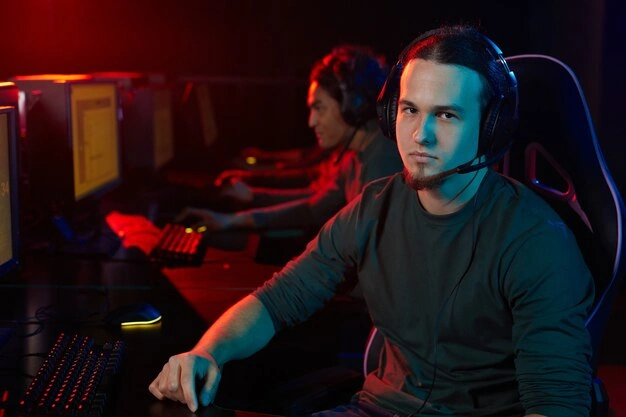Now Reading: How Esports can shape the future of competitive gaming in 2025
-
01
How Esports can shape the future of competitive gaming in 2025
How Esports can shape the future of competitive gaming in 2025

Of late, competitive gaming, popularly known as esports, is changing rapidly. By 2025, more important roles would be played by sports in what this future would look like. From the arrival of traditional sports organizations within the world of esports to seemingly logical integrations of sports elements into gaming, coming together of the two worlds will give birth to new opportunities and fundamentally change the competitive gaming landscape.

In this article, we will run through how sports have an influence over competitive gaming, what trends are happening in 2025, and what it all means to the players, the fans, and the industry in general.
Rise of Esports and Ties to Traditional Sports
Traditional sports, such as football, basketball, and tennis, have the huge playground of competition and cooperation but also for entertainment. However, only the sports bodies realized that such huge potential exists in esports. It has been pumping more money into this field. From the world of traditional sport, main leagues, clubs, and players now come into the sphere of esports through different channels, such as owning an esports team and holding competitive events.
In general, the mutual benefits for such collaboration are apparent: traditional sports organizations bring into the world of esports credibility, infrastructure, and fans, while, in return, it offers an entirely new field for reaching more youthful audiences. Paving a road for the whole new age of competitive gaming means that each world may very well coexist with each other quite successfully.
Esports teams and organizations invested.
In 2025, it is stronger than ever for trends of sport teams and other organizations in investing in esports. Most professional sport teams today have their very own professional esports teams and athletes, letting their physical fields go to the virtual arenas. They now compete with some of the world’s most popular titles like in the traditional sports world, such as FIFA, NBA 2K, Rocket League, and League of Legends.
Perhaps the most powerful partnerships would be between esports and traditional sports leagues. Consider, for example, the NBA 2K League-the esports competition centered on the NBA 2K video game series-or, for example, the premier League, in which FIFA players compete representing the real-life teams of the English Premier League.
An ever-increasing number of such relationships is emerging because franchises and leagues wake up to the commercial revenue that is coupled with them. With such mass visibility and access, the chances of brands and sponsors, therefore, want to tap into this ever-growing market promotes even more affiliation between traditional sports and competitive gaming.
Inclusion of Sport Elements within Game Titles
With the increasing influence of sports on competitive gaming, game developers are incorporating more and more real-life sports elements into their gaming titles. From authentic gameplay mechanics to official team rosters and even sponsorships from the real world, this has been a recent trend in gaming titles.
For instance, sports simulation games like FIFA, Madden NFL, and NBA 2K have been around since both gamers and sports enthusiasts can remember. However, even with such strong standing in both worlds, their line is becoming obscure as these games adapt to very competitive elements: online tournaments, leaderboards, and professional leagues.
By 2025, game titles will have sports-like structures with dedicated esports leagues, seasonal tournaments, and rewards for top performers. The play in such games is most likely to be much more professionalized than now; its structure and organization will be close to that of a traditional sports league.
There is also the impact of virtual reality (VR) and augmented reality (AR) technologies that will bring the feeling of sports-based video games to an entirely new level. Players can simulate real life sports that they enjoy in a digital world.
The Impact of Sports Data and Analytics in Competitive Gaming
Sports data and analytics shall play a tremendous role in 2025 that would go all the way forward in determining how competitive gaming unfolds. Indeed, data analytics that apply to the assessment of how some player performs or how a certain team plays goes all the way to game results, etc. The same has been happening with competitive gaming whereby gamblers and teams are increasingly more reliant on facts and figures so as to have a better shot at enhancing caliber and beating rivals.
Data analytics helps esports organizations and players trace the performance made in-game or the progress, and track in which areas and what improvements would be needed. For very high-end equipment, esports teams use software to track behaviors of their team and map history-based strategies onto them to understand match outcomes ahead of time.

Like the traditional sports teams, esports teams are now using data-driven thinking to help their players level up their skills. As the size of the industry continues to increase, data analytics will play a much bigger part in competitive gaming, elevating the performance of players and teams.
The Rise in Esports Betting and Fantasy Leagues
Finally, mainstream popularity of esports opens people up to an opportunity to popularize betting and fantasy leagues. The same thing happens with other traditional sports, since now the fans of esports are allowed to place bets on their favorite players, teams, and tournaments. All of this could happen only because of the emergence of the platforms of betting on esports that have found new ways to work with the fan support of the athletes.
The popularity of esports betting shall reach unprecedented peaks in 2025 when other platforms present major esports event odds, sports-themes games in particular. Fantasy leagues that have come for esports offer even more for avid fans: as they are provided with an alternative to playing out their fantasy to the maximum using virtual teams on which they’ll compete with a different kind.
This will further enhance the overall fan experience and even make it more engaging and immersive because of this blend of sports betting and fantasy leagues with esports. Soon, they will form an important part of competitive gaming as esports will then be popular and highly established in the near future.
How Sports Are Shaping the Future of Esports Culture
Traditional sports also influence the culture of competition of gaming because these are affecting esports. The more athletes and teams that enter the world of esports, the more perception changes about gaming itself. Such a perception that gaming is exclusively for “nerds” or “geeks” is dying out with time, and gaming is seen as a highly legitimate competition in the same light as traditional sports.
Esports players that were once social outcasts now attract the same levels of attention and respect as professionals. In 2025, many more esports’ players will be repping endorsement deals, appearing in mainstream media outlets, and set to become a cultural phenomenon. Traditional sports culture continues to inch its way slowly toward breaking even more barriers but expanding the fan base for competitive gaming.
The other is how the overlap of sports and esports might give us new ways to engage with fans, creating new forms that are part of both worlds. Take live events for esports featuring athletes from one or both domains. Such an experience can result in a delightful fan experience.

Future of Sports and Esports: What’s Next?
Competitive gaming by sports will continue to shape the future of sports. For beyond 2025 and onwards, one is going to experience much more amalgamation between the traditional sports leagues and the new-age esports organizations, new games with sports-related themes popping everywhere, and ever-growing injection of technology such as VR and AR in the game.
All the above novelties will continue developing, to say nothing of viewership, sponsorship, and monetization in the field of esports. Investments by sports organizations will be even larger, making all these new game players better equipped with updated tools and tools.
Conclusion
Eventually, this sport and esports merger will make the playing field dynamic and thus open to all, so ample opportunities abound for players and fans. Indeed, if one is just a mere sports fan; a hardcore gamer; or at least interested, for whatever it’s worth, in the futures of entertainment; then competitive gaming in 2025 looks fabulous.
It is no doubt that sports and esports are converging into framing the future of competitive gaming in 2025. Involvement from traditional sports organizations, plus putting the sport element in the games has in reality served to offer a more than apparent place where innovation can happen along with creating new chances. Because of the continually developing overall esports ecosystem, it becomes crucially related to deciding the way in which things would take place going forward in years to come. The whole experience of competitive gaming will be even more thrilling and engaging, as it integrates the thrills of old-fashioned sports with the possibilities that the digital world offers.



























